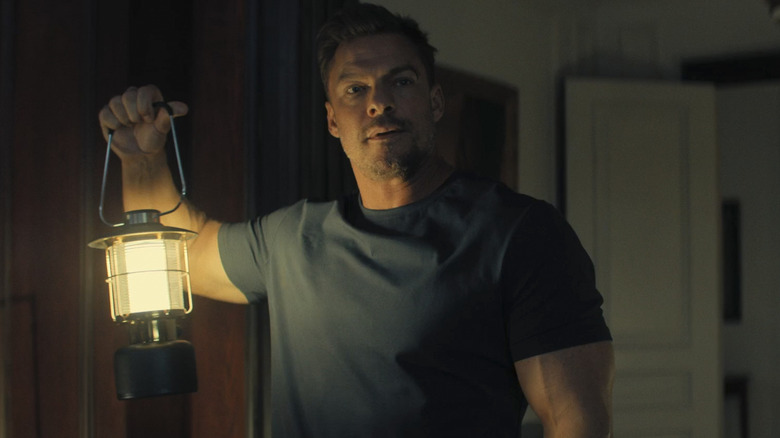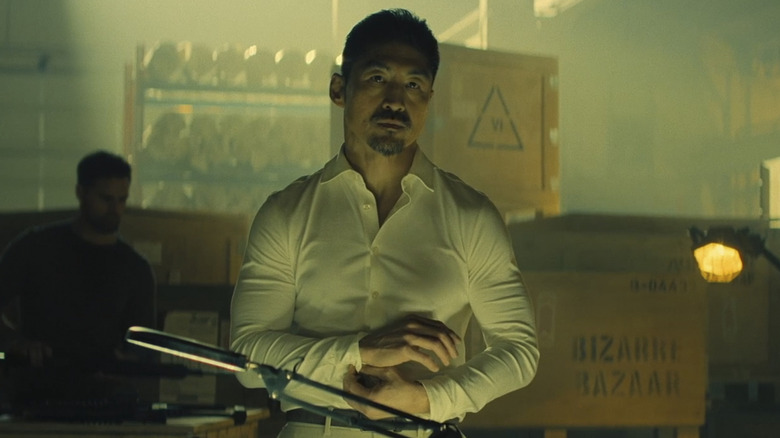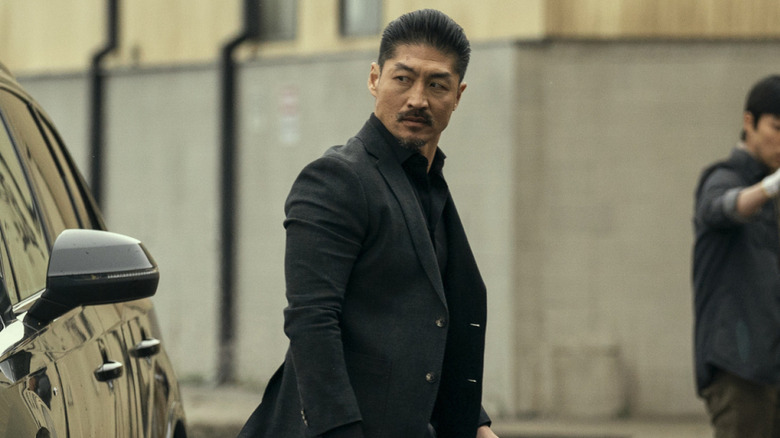The Reacher Season 3 Finale Takes A Different Approach To A Major Book Death
Spoilers for "Reacher" follow.
It took a long time, but after eight episodes filled with punches and explosions, Reacher (Alan Ritchson) finally got his man. Not just for himself, of course, but for Kohl (Mariah Robinson). A careful mix of revenge and justice unfolded after some tough negotiations with Russian arms dealers, leaving Quinn (Brian Tee) outgunned and without options. The only one left standing with him was the enemy that had been hiding in plain sight. Fitting then, that history almost repeated itself, and Quinn did his best to negotiate his way out of the inevitable with a man he failed to remember until it was far too late. The outcome was swift and cold— exactly what Quinn deserved — but it was also drastically different from how he met his maker in the original book that fuelled the latest season of "Reacher."
Rather than keeping our view up close and personal, we saw Quinn's execution from afar, with the flash of shotgun sparking the scene and knocking the villain off his feet and out of the game for good. Compared to Quinn's original exit, it was far more effective and fitting for Reacher's motivations driving him since the start of this season, rather than the rushed and ruthless bit of retribution he delivered in the book. It's in this case that the show actually surpassed the pages it was pulling from and allowed the audience and our hero to savor the moment fully.
Quinn got an ice-cold death in the Reacher books
In Lee Child's seventh Jack Reacher book, "Persuader," (the best book in the series), which the third season is based on, Quinn meets a quicker and much more unsettling end than the one depicted in the show. For one, he isn't fleeing the scene but enjoying a cigar with Beck (Anthony Michael Hall) in the mansion before Reacher gets the drop on him. After punching Beck and letting him fall to the floor, Quinn tries to take a run at our hero and fails miserably, with Reacher reacting with a gut punch and letting Quinn curl over in pain before applying a far more intense method of taking the bad guy down.
After removing a hidden chisel from his person, Reacher sticks it in Quinn's ear and doesn't stop pushing until only the handle is showing. It's brutal, borderline disturbing, and puts an end to Quinn in a much more barbaric fashion. As far as death scenes go, the one Reacher's nemesis endures in the show is far more impactful and effective. In the book, there's no talking it over, no demand from Reacher that Quinn figures out why he's being visited by this hulking stranger with a score to settle. It makes sense then, that in the show's finale, a lot more care was applied. In doing so, it strikes an emotional chord with Reacher accomplishing his mission and making that final shot one worth taking.
Quinn's death is better in Reacher than in the book
This season has shown us a terrifying side to Reacher, but the motivations that brought this side to the surface are totally valid. Quinn somehow escaped the punishment Reacher believed was fitting of the man who tortured and killed his friend, so in this season's final chapter, he not only finally does what's needed but reminds Quinn of the history they share together. It's the arms dealer's final lightbulb moment that makes it feel so much more rewarding and actually surpasses the original death scene from Childs' book.
By the time Reacher finally gets around to marking Quinn off his list in "Persuader," he's exhausted from his lengthy undercover mission and the final push to eliminate his enemy's operation. As a result, Quinn's death doesn't land with as much weight or satisfaction. The chisel goes in, and Quinn goes down. That's the end of it. It highlights that regardless of his history, he was just another chore for Reacher to complete. In the case of the show's version, it feels a lot more personal, mainly thanks to Alan Ritchson's performance and the brilliant fourth episode of the season that revealed why he was gunning for Quinn in the first place. It also proves that on the rarest of occasions, adding something extra to an adaptation can sometimes pay off far better than the source it's taking from. Way to go, Reacher.


